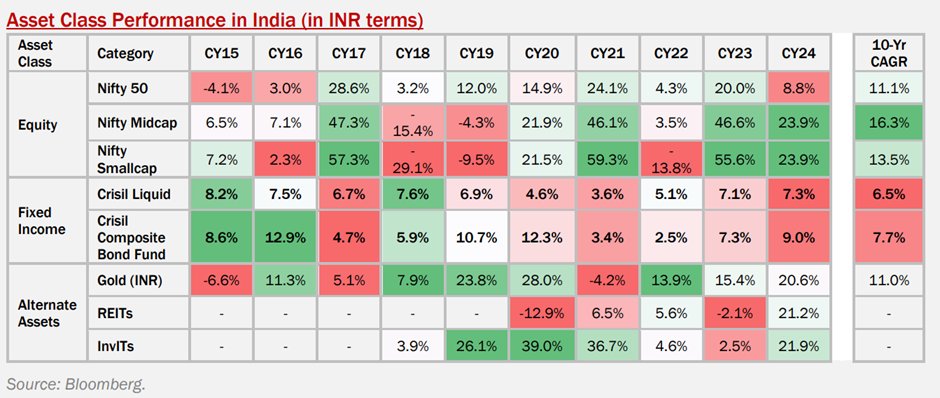CAGR Insights is a weekly newsletter full of insights from around the world of the web.

Chart Ki Baat

Gyaan Ki Baat
ESG Investing: A New Era of Responsible Investment
ESG investing focuses on environmental, social, and governance factors, aiming to support companies that align with sustainable, ethical practices. It considers a company’s impact on the environment, its treatment of people, and its governance standards. ESG investing can offer long-term financial benefits by promoting better risk management and innovation. As investor interest grows, more funds are available to align portfolios with ethical values, contributing to a more sustainable and equitable world while potentially yielding strong returns.
Personal Finance
- Invest Wise: Turning Your Passion into a Financial Plan: As people increasingly seek to retire early and pursue passions, financial planning must account for these aspirations. Unlike traditional goals, passion-driven goals may require higher risk investments like equities for growth, but as the goal nears, funds should shift to lower-risk assets to ensure stability and avoid delays. Read here
- Taxation of Mutual Funds in India: Mutual fund gains, including dividends and capital gains, are taxable. Debt mutual funds are taxed at the investor’s slab rate without indexation. Tax rules vary based on the fund type (equity, debt, hybrid) and holding period, with longer holding periods often resulting in lower taxes. Read here
- Government Plans NPS Reforms to Enhance Pension Coverage for Gig Workers: The Atal Pension Yojana (APY), launched in 2015, aims to provide pensions to unorganised sector workers. With over 61 million subscribers, the government is considering increasing the minimum pension amount in the upcoming budget to enhance the scheme’s appeal. The PFRDA has requested a budgetary proposal for this hike. Read here
Investing
- Gold Rises to $2,750 Driven by Trade Uncertainty and Fed Rate Cut Expectations: Gold prices surged to $2,750, the highest since November 1, driven by safe-haven demand amid US tariff threats and global uncertainties. Declining US Treasury yields and expectations of Fed rate cuts support the rally. However, a recovery in the US Dollar and potential Bank of Japan rate hikes may cap gains. Read here
- Zerodha Explains Information Ratio: Is Your Investment Worth the Risk: The Information Ratio (IR) measures the risk-adjusted return of equity mutual fund schemes, helping assess a fund manager’s performance relative to its benchmark. SEBI mandates its daily disclosure to enhance transparency. IR evaluates both returns and risk, guiding investors to make informed decisions by considering consistency and performance. Read here
- Sebi Considers Allowing Pre-Listing IPO Trading to Curb Grey Market Activity: SEBI is considering a “when-listed” trading period for IPOs to curb grey market activity and enhance transparency. Chairperson Madhabi Puri Buch emphasized the importance of ethical governance and investor trust. SEBI is also focusing on improving transparency around Related Party Transactions and promoting ethical wealth creation in India’s growing IPO market. Read here
Economy & Sectors
- Steel and Cement Cartels Hindering Infrastructure Development, Says Nitin Gadkari: Union Minister Nitin Gadkari criticized steel and cement industry cartels for hindering infrastructure development, urging the use of fiber-reinforced plastic (FRP) as a cost-effective alternative. He called for a 20-25% price reduction in FRP, emphasized domestic R&D, and highlighted plans to make India a global auto hub and energy exporter. Read here
- Government Disburses Rs 1,596 Crore Across Six PLI Schemes in April-September FY25: The government disbursed Rs 1,596 crore under Production-Linked Incentive (PLI) schemes for six sectors in the first half of fiscal 2024. The largest allocation went to electronics (Rs 964 crore), followed by pharma. PLI schemes have attracted Rs 1.46 lakh crore in investments, boosting production, employment, and exports. Read here
- Union Budget to Focus on Fiscal Consolidation and Growth; Capital Expenditure Projected at Rs 11-11.5 Lakh Crore: The 2025-26 Union Budget will balance fiscal consolidation and growth, with capital expenditure rising to Rs 11-11.5 lakh crore. Priorities include boosting consumption, private investments, and key schemes. Fiscal deficit is expected to reduce, while subsidies will decline slightly. Initiatives for MSMEs, infrastructure, and sustainable tourism are also anticipated. Read here
****
Check out CAGRwealth smallcase portfolios
Our smallcase portfolios are ranking well in the smallcase universe in terms of 1-year returns.
• CFF (launched in June 2022) – Ranked 2nd amongst smallcase with medium volatility.
• CVM (launched in May 2022) – Ranked among Top 20 across the Momentum smallcase universe.
Do check it out here
****
That’s it from our side. Have a great weekend ahead!
If you have any feedback that you would like to share, simply reply to this email.
The content of this newsletter is not an offer to sell or the solicitation of an offer to buy any security in any jurisdiction. The content is distributed for informational purposes only and should not be construed as investment advice or a recommendation to sell or buy any security or other investment or undertake any investment strategy. There are no warranties, expressed or implied, as to the accuracy, completeness, or results obtained from any information outlined in this newsletter unless mentioned explicitly. The writer may have positions in and may, from time to time, make purchases or sales of the securities or other investments discussed or evaluated in this newsletter.






